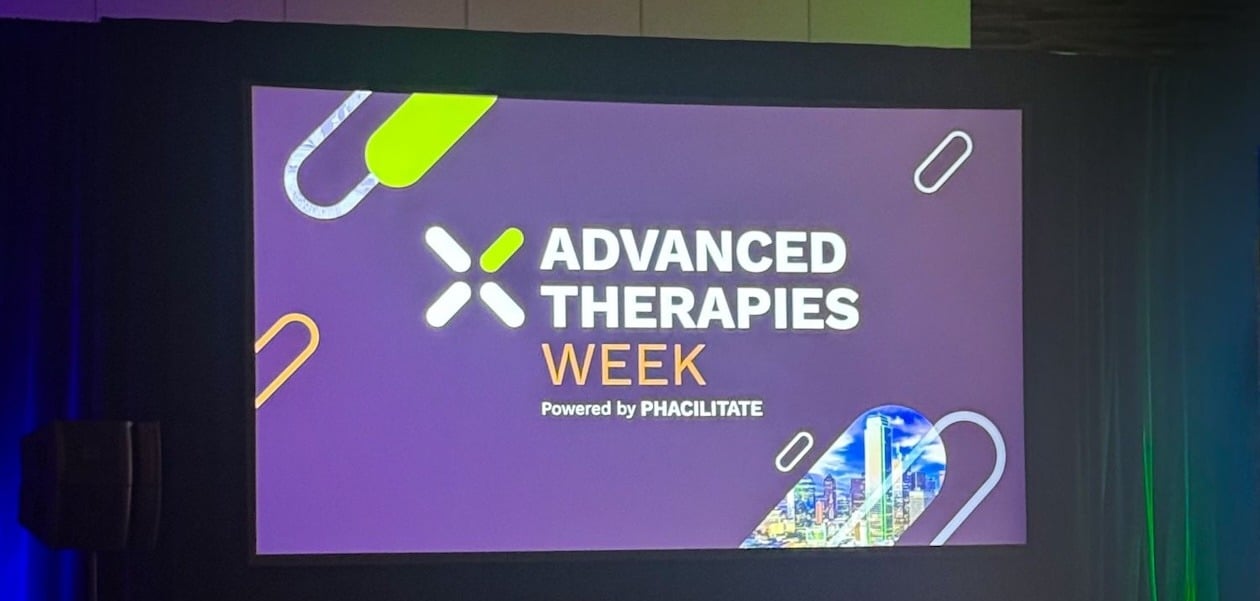Advanced Therapies Week 2025: Key Insights

Posted by:
Alexis Tzannis
Published on:
Feb 12, 2025
My key takeaways from Advanced Therapies Week in Dallas, Texas include the tremendous progress being made in cell, gene, and tissue-based therapies, as well as the practical challenges of bringing these next-generation treatments to patients.
One of the most striking insights was the sheer breadth of emerging technologies in areas such as CAR-T immunotherapy, CRISPR gene editing, and regenerative medicine applications.
Manufacturing and supply chain landscape is complex
CGT manufacturing is becoming more automated and integrated, yet it still falls short on scalability for a market projected to exceed $23 billion by 2028, with 26% annual growth. Key hurdles include human-dependent processes and production timelines measured in weeks instead of days. Maintaining cell viability and quality through every step of collection, transport, and storage in manufacturing and the supply chain is critical.
The conference highlighted numerous innovations aimed at automating and streamlining these processes and particularly increasing overall CGT manufacturing efficiency. However, close collaboration between technology providers, manufacturers, and clinicians is essential to achieve this goal.
Recent research is shifting toward in vivo gene therapy to reduce treatment timelines and costs. Directly delivering genetic material into the body avoids the complexities of ex vivo approaches – no cell harvesting, lab-based modification, or lengthy expansion, which cuts costs and infrastructure demands. Improved vector design offers more precise tissue targeting.
Nonetheless, immunogenicity, off-target effects, and long-term safety remain serious concerns, as unintended immune responses and unpredictable vector distribution can hamper efficacy and raise safety questions. Despite these challenges, the potential for quicker, more affordable treatments drives ongoing innovation.
Incorporate regulatory planning right from the start
I gained a clearer understanding of how regulatory bodies like the FDA and EMA are keeping pace with these pioneering therapies. Early engagement with regulators, robust data to demonstrate safety and efficacy, and a willingness to adapt to evolving guidance are essential elements of a successful regulatory strategy.
Financing and reimbursement strategies are critical
Reimbursement and market access strategies can make or break advanced therapy programs. Conference attendees shared insights into creative financing and reimbursement models. Building strong relationships with insurers, policymakers, and patient advocacy groups will help to ensure these treatments can be adopted widely and equitably.
Significance of partnership and collaboration
Lastly, the event emphasized the enormous value of partnership and collaboration. No single organization can address every scientific, manufacturing, regulatory, and funding challenge alone. Overall, Advanced Therapies Week highlighted not just the potential of these groundbreaking treatments to transform healthcare, but also the concerted and collaborative effort required to successfully move them from the lab to the clinic.
Partner with us for your advanced therapy development and commercialization
Are you ready to tackle the challenges of advanced therapy development and accelerate your breakthroughs to market? Our team offers a deep understanding of systems biology, automation, fluidics, and real-time analytics that can be tailored to your specific needs – without requiring a one-size-fits-all platform.
One of the first questions we address is: How do you automate viability cell counts efficiently and reliably? Beyond that, we can help you measure the number of residual beads via turbidity, leverage flow cytometry modalities to characterize modified T-cells (CD45, CD3, CD4, CD8) and B-cells (CD19), and ensure bacterial contamination safety assays are fully integrated.
Drawing on our technical know-how, we’ll work alongside your team to design robust workflows and create the ideal conditions for cell culture, data management, and quality control.
Contact us today to learn how we can help you transform your vision into a successful therapeutic reality.
